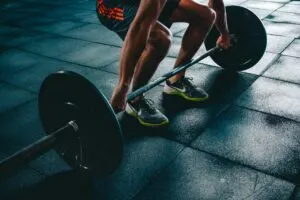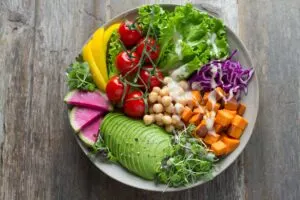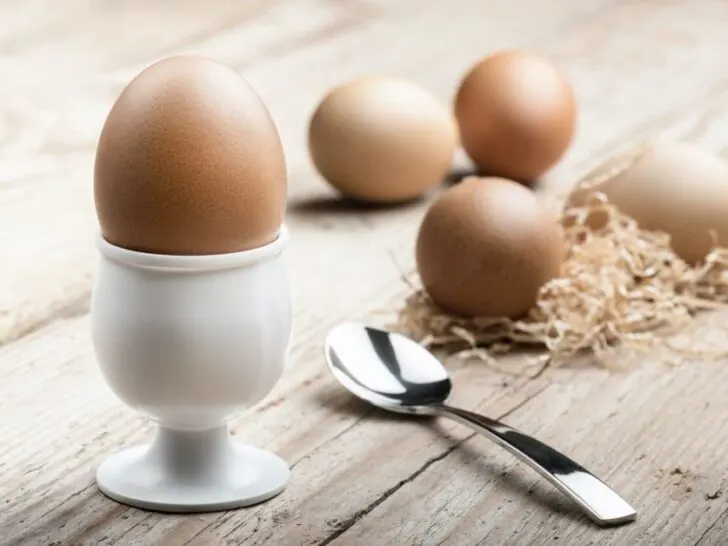Some of the links in this post are affiliate links. This means if you click on the link and purchase the item, we will receive an affiliate commission from the vendor at no extra cost to you. These business relationships allow us to keep bringing you great EatMoveHack content. All opinions remain our own.
A Simple Nutrition Plan for Muscle Gain
If muscle growth is your objective, you know that your workouts are important, but so is your diet. There are so many options out there today and it can be difficult to make a choice or stick to it. We are going to have a look at a simple nutrition plan for muscle gain that is easy to maintain over time and will help you achieve the muscle growth and body weight that you wish!
Foods to Focus On
First, let’s look at the main food groups that we are going to discuss in this article.
Carbohydrates (often referred to as “carbs”):
Carbs are good for energy, as your body needs the glucose they contain, but not all carbohydrates are good for you! “Simple” carbohydrates are basically sugars, and you don’t need that much of those. Keep in mind that generally, the more processed the food is the higher the ratio of carbohydrates will be. You want to stay clear from sodas, cakes, sugary cereals, etc. However complex carbs, that take longer to break down in your body, will help with energy and those often contain high fibers as well. Whole grains, beans, and legumes (such as green beans, lentils, chickpeas), oats, and fruits are a better source of carbs to achieve muscle growth.
Fats:
They are needed by your body for organ protection, cell growth, and more. What is often referred to as “healthy fat” can be found in foods such as nuts, olive or coconut oils, avocados, fatty types of fish. The ones you want to avoid are trans fat (also called trans fatty acids), which amongst other things have a bad effect on your cholesterol levels. They are mainly present in processed food such as fried food or fast food, baked foods like cakes, cookies, and frozen pizza.
Proteins:
This is the last food group and is important for muscle growth and to help your body with injury repair. You will find them in eggs, meat, fish, and dairy products, but also in some grains and nuts.
Your body needs all of these to function properly, the proportions of each being the important part! A common misconception is that you need a huge amount of proteins to build muscle mass, but you also need carbs and fat. A standard split of the food groups to help muscle growth is 40 to 60% carbs, 25 to 35% proteins, and 15 to 25% fat. In our opinion, the important part here is to focus on picking “good foods” in those groups. You might need a bit of trial and error to determine what is the right split for you.
Finally, one food that does not get mentioned enough is…water! Hydration is important for your body and you need to drink not only when you work out and sweat but constantly throughout the day. Your needed water intake will need to be adjusted depending on physical activity, as well as your body size and weight. You also need to take into account the climate: if you are in an environment that is warm, you will need to increase a bit your water intake daily.
The Best Diet Tips for Building Muscle

When it comes to diet, there is no one size fits all, so you might need to adjust the following. With the goal of muscle gain, you want to build a diet plan that will help you add muscle without gaining fat.
First, you want to plan your food intake accordingly to your workout plan. On days when you are working out, you need enough food to help you build muscles. On days when you are resting, you need enough to not lose muscle mass.
Second, a lot of research shows that eating before and/or after a workout helps with muscle gain. It doesn’t have to be a big meal, but you want to consider eating a snack or a small meal around your workout time.
General Food Tips:
Your food intake will be determined by your body mass. There are several methods to work out the number of calories you need per day and that can be one way of calculating your optimal food amount. You can also experiment with our meal plan below and adjust quantities as you feel necessary.
The point is to have a food intake that provides more calories than your body really needs and to use this extra intake to build muscles instead of accumulating fat.
Looking back at the food groups we just discussed, one of the main difficulties for a lot of people is avoiding processed foods. While taking out a meal or snack from the freezer or from the corner store is easy, it is often packed with trans fats or extra sugar that is not going to help with your muscle growth goal.
When it comes to meals, one tip that can help is to prepare ahead of time when you cook and to freeze meal portions. For example, batch cook a bigger amount of some of the meals ideas below that can easily be stored or frozen for later, such as curry or chili con carne. The same can be done with a lot of cooked vegetables.
Another good trick is to stock up on snacks that are healthy and contributing to your food intake, such as nuts, cereal or protein bars, fruits such as bananas or berries, etc. Some of these are easy to carry around with you or have them available in the car, in your office, etc. That way, you can avoid the temptation of buying whatever is available from the vending machine or the store next door!
Our Favorite Meals for Muscle Gain
Here are a few ideas about meals you can use for muscle growth. One way to adjust the quantities of food you are eating is to increase/decrease the size of portions. Another method is to break it down to smaller meals and eat more often during the day.
The quantity you need to eat will depend on your body size and weight. One way of determining quantities is to set up a target of calories you need to eat per day. You will find plenty of apps that can help you do that.
As mentioned above, you will need to keep in mind the proportions of the different food groups in your diet. For more information about macronutrients, have a look at our article about macro planning here.
Breakfast:
- Eggs, Greek yogurt, berries
- Oatmeal with milk, nuts
- Whole grain bread, turkey ham, avocado
- Mushroom, cheese, vegetable omelet
- Scrambled eggs with salmon
You can also have a look at our ideas for breakfast with vegetables.
Lunch:
- Green beans, salmon, fruit
- Brown rice, chicken breast, yogurt
- Sweet potatoes, eggs, cottage cheese
- Hummus with vegetables, omelet, fruit smoothie
- Chicken, avocado, tomato sandwich
Post-workout:
- Whey protein shake
- Fruit smoothie with added almond or peanut butter
- Bananas
- Peanut butter sandwich
- Dried fruits and nuts
Dinner:
- Spinach, chickpeas, beef steak
- Pasta with vegetables, a slice of cheese
- Lentils curry with shrimps, fruit
- Pork chops, vegetables, and brown rice
- Chili con carne, berries
Should You Supplement for Muscle Growth?
A lot of research shows that protein intake is important for muscle growth. It does not mean it is mandatory, but it could give you a little boost. Also, if you are struggling with your protein intake every day, using whey protein might give you extra help reaching your muscle growth goals. Protein powder is not the only method to help your daily intake but it is most certainly one of the easiest ways to do so.
There are plenty of protein supplements out there, at EMH we like Optimum Nutrition HydroWhey (Get it HERE), that is being used by “The Rock” himself. The most common way of using whey protein for muscle growth is to take it before or after your workout, and this can be as easy as just taking with you a protein drink to the gym.
We covered recently some biohacks for muscle growth that can also help you reach your goal faster, check them out! You can also have a look at our favorite pre-workout
If you are doing an important change to your diet in order to achieve muscle growth, it might be beneficial to consult with your health practitioner or a nutrition specialist.
With this simple nutrition plan for muscle gain, you are ready to achieve your muscle growth target!
Here is some other great Eat.Move.Hack articles to help you make smart and easy food choices – Eat.

